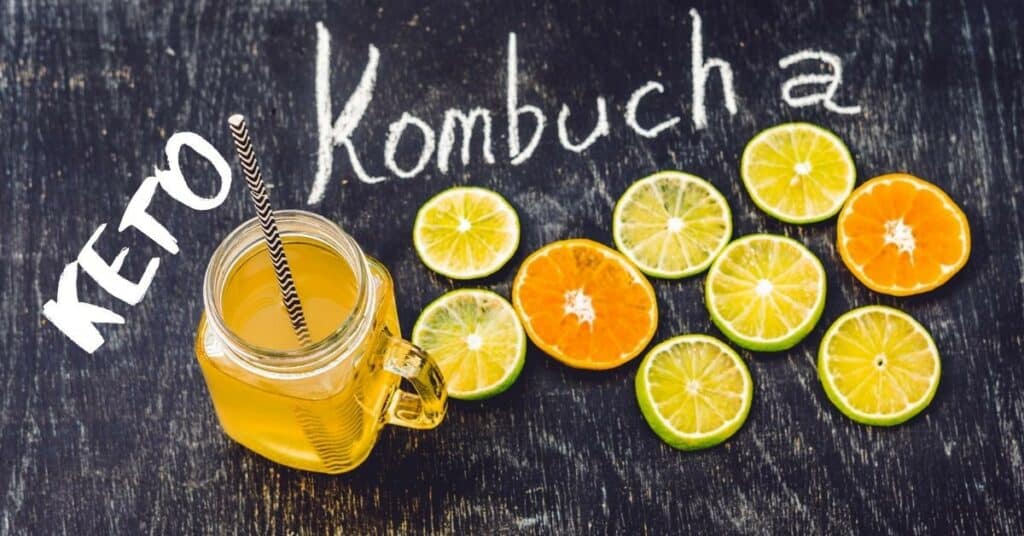If you want to give your digestive system a boost, then you might want to try Kombucha. It contains healthy bacteria and yeast that improve gut health, but is it keto-friendly?
Many forms of Kombucha are sources of hidden sugars and the carbs content per serving might not be attractive for a ketogenic diet.
If you’re just on a low-carb diet and don’t need to stay in ketosis, then you can enjoy Kombucha in small amounts. You can even make your own at home!
In this article, you’ll learn everything you need to know about Kombucha and whether or not you can drink it on the ketogenic diet.
We’ll also show you how to make your own Kombucha at home and where to buy low-carb brands.
What is Kombucha?
Kombucha is a beverage that is made by fermenting black, green or oolong tea together with sugar and a SCOBY (symbiotic culture of bacteria and yeast) for up to ten days.
The fermentation process gives this tasty beverage fantastic digestive benefits, but unfortunately, the sugar works against your gut health by provoking inflammation.
The SCOBY contains a variety of microorganisms that look similar to a mushroom cap. It includes the following blends of bacteria and yeast (1):
- Acetic acid bacteria
- Acetobacter xylinum
- Acetobacter aceti
- Acetobacter pasteurianus
- Gluconobacter oxydans
- Saccharomyces sp.
- Zygosaccharomyces kombuchaensis
- Torulopsis sp.
- Pichia spp.
- Brettanomyces sp.
- Zygosaccharomyces bailii
In some cases, several forms of lactic acid bacteria are also added. After the fermentation process is complete, the final result is a combination of several different chemical substances that includes tea polyphenols, sugar, organic acids, fiber, amino acids such as lysine, ethanol, water-soluble vitamins, including vitamin C and several B vitamins, and minerals such as copper, iron, magnesium, and zinc.
Research shows that this blend of nutrients in Kombucha gives it powerful antioxidant and anti-inflammatory abilities.
It has been shown to reduce cholesterol and blood pressure levels, help slow the spread of cancer, improve liver health, and boost digestive and immune system health. All of these benefits are due to the powerful impact Kombucha has on the microbiome.
As we mentioned above, the problem with Kombucha is that it contains sugar, which is not allowed on a low-carb diet. Sugar is not a keto-friendly food, it is highly inflammatory and can kick you out of ketosis.
Here is the nutritional breakdown of a one-cup serving of KEVITA Master Brew Kombucha Pineapple Peach Flavor*:
- 35 calories
- 0 grams of fat
- 8 grams of carbs
- 8 grams of sugar
- 0 grams of protein
*Other brands might have different nutritional values.
Benefits of Kombucha
Although it contains sugar, which is contradictory to its many health benefits, there are many reasons why you should include Kombucha in your diet. Most of them are due to its ability to impact gut health.
Unfortunately, most of the studies done on Kombucha involve animals and not humans. A recent review done in 2019 found that there is only one study done on the effects of Kombucha on humans (2).
More research is definitely needed. In the meantime, here are the top health benefits of Kombucha:
#1. It has anti-inflammatory and antioxidant properties
Research shows that Kombucha contains several organic acids, 14 amino acids, vitamins, and some hydrolytic enzymes (3).
These nutrients are responsible for giving Kombucha it’s anti-inflammatory and antioxidant properties.
Why is this important? It’s because inflammation is the driving force behind many diseases and unwanted symptoms.
The good bacteria, vitamins, enzymes and other nutrients in Kombucha help reduce oxidative stress and prevent DNA damage. It also reduces total body inflammation, including digestive inflammation, which is responsible for a host of different ailments such as gas, bloating, weight gain and even fatigue.
#2. It contains several strains of bacteria and yeast that positively contribute to health
As mentioned above, Kombucha goes through a fermentation process that involves adding good yeast and bacteria to the tea.
Research shows that several strands of these yeast and bacteria have numerous health benefits.
According to one study, the bacteria Acetobacter, Gluconobacter, and the yeasts of Saccharomyces as well as glucuronic acid give Kombucha to the following health benefits:
- Reduces cholesterol and blood pressure levels
- Helps slow down the spread of cancer cells
- Improves liver function
- Boosts immune system and digestive health
Authors of the study found that these bacteria and yeast work together to protect your body by acting synergistically (4, 5).
#3. It may help reduce blood sugar levels
According to one study, fermented tea has been shown to help reduce blood sugar levels.
Authors of the study prepared fermented black tea by adding sugar and a blend of yeast and bacterial species to it and letting it sit for four to five days. The tea was then given to 24 different subjects from the ages of 45 to 55 in the amount of 60 ml per day for 90 days.
Results found that initial mean fasting and post-prandial blood sugar levels both reduced after the 90 days. It was noted that after 30 days of consuming the tea, stabilization of blood sugar levels was within normal range in the subjects (6).
This data suggests that drinking fermented tea can help reduce blood sugar levels and put them back in a normal range.
In case you’re wondering, eating a ketogenic diet can also reduce blood sugar levels because it eliminates sugars and carbs from your diet so that you no longer require an insulin response.
#4. It helps reduce the risk of cancer, diabetes, cardiovascular disease, and more
Even if you don’t drink fermented tea, regular black and green tea has numerous health benefits.
According to one study, black and green teas provide the following health benefits (7):
- Anti-aging
- The maintenance of cardiovascular and metabolic health
- Prevent atherosclerosis and coronary heart disease
- Anti-diabetic
- Cancer prevention (Skin, prostate, lung and breast cancer in humans)
- Helps manage arthritis symptoms
- Promotes brain health
- Reduces the risk of Parkinson’s disease
The numerous health benefits of tea are associated with its high polyphenol content. These have an antioxidant and anti-inflammatory effect on the body to promote numerous areas of health.
#5. It has antimicrobial properties
According to one study, fermented Kombucha demonstrated antimicrobial activity against E. coli, Sh. sonnei, Sal. typhimurium, Sal. enteritidis, and Cm. jejuni bacteria (8).
Why is antimicrobial activity important? It can help your body fight off germs, yeast overgrowth, and other bacteria that may lead to serious diseases. It also boosts your body’s immune system to better enhance your built-in immune response.
#6. It improves digestive health
Kombucha is infused with probiotics, which are good strains of bacteria and yeast that positively contribute to digestive health.
Research shows that probiotics help boost your immune system, improve digestive function as well as nutrient absorption, and protect you against infections (9).
Your digestive system wears many hats, which means that keeping it healthy is extra important.
For example, your digestive system houses approximately 80 percent of your immune cells. Keeping your digestive system working properly can help you fight colds by boosting immune function.
Your digestive system also “communicates” with your brain through the vagus nerve. It tells your brain when it’s distressed and this can make you feel anxious, depressed, or irritable.
Probiotics can also help keep you regular and reduce symptoms of digestive ailments, such as bloating, gas, and pain. They also help keep you energized by improving the efficiency of your ability to digest and metabolize nutrients!
Is Kombucha Keto-Friendly?
Despite these numerous health benefits that affect several aspects of your health, many store-bought Kombucha products are not a keto-friendly beverage.
This is because it is made with simple sugar and contains too many carbs to be consumed on the ketogenic diet.
However, Kombucha might be suitable for a low-carb diet if you find a brand (or make your own) with low sugar. Unfortunately, the fermentation process requires some sort of sugar and yeast, and Kombucha can’t be made without it.
If you want the amazing health benefits of all that good bacteria, then we recommend drinking unsweetened tea for the polyphenols and taking a probiotic for the “good” bacteria.
There are also many low-carb probiotic rich foods that you can eat. You can find this list here!

How to Make Kombucha From Home
There aren’t many low-carb Kombucha products on the market that we could find, but KeVita makes a sparkling probiotic drink that is sweetened with stevia and apple cider vinegar instead of water.
It’s not a true Kombucha, but it will get you the good healthy bacteria that you desire from tea! It contains 5 calories per serving and one gram of carbs. You can check it out here.
Otherwise, you can make Kombucha at home, but it still requires the use of sugar. Keep this in mind if you’re on a low-carb diet because you’ll want to limit the amount of sugar you use.
It helps to purchase a Kombucha starter kit, which has everything you need to make Kombucha. We like the Kombucha Shop’s Kombucha Brewing Kit from Amazon because it’s a bestseller.
It comes with a one gallon glass brew jar, Kombucha SCOBY and starter pouch, a temperature gauge, pH strips, and loose leaf tea.
Otherwise, you’ll need to purchase all of these items on your own individuality! Before you get started, you’ll need to collect these items:
- A one-gallon glass mason jar
- Large stock pot
- Paper towel or coffee filter to cover the jar and secure while it ferments
- A small funnel (not required)
Here are the ingredients:
- 8 bags of black or green tea
- One cup sugar
- 3.5 quarts of water
- One SCOBY per mason jar
- 2 cups starter tea or store-bought Kombucha
Here is how to make Kombucha from home:
The first thing you’ll want to do is make the tea base. Do this by bringing the water to a boil in the stock pot. Once it boils, remove from heat and add the sugar. Stir until the sugar dissolves.
Place the tea inside the water and allow it to steep until the tea mixture cools off. This may take a few hours, but you can speed up the process by adding some ice cubes. Keep in mind that you may need to add more tea/sugar if you add more water or ice cubes.
Next, you’ll want to add the starter tea to your tea base. First, remove the tea bags from the tea base and then add the starter tea. Stir together until blended. The starter tea helps pasteurize the tea, so to speak, so that you don’t develop unwanted bacteria while the tea ferments.
Now you’ll want to transfer the tea to your one-gallon mason jar and add the SCOBY. Cover the mason jar with a tightly sealed cloth, such as a paper towel or a coffee filter. Secure it with a large rubber band.
Let the tea sit tightly covered for up to ten days. Keep in mind that it’s natural for the SCOBY to float to the top of the tea. Check your tea periodically.
Within a few days, a new layer of SCOBY should start to form in your tea. The two SCOBY’s may connect together. After about seven days, start to taste your Kombucha daily to make sure it has a nice blend of sweetness and tartness.
When you get the desired taste you want, remove the SCOOBY from the tea and set it aside on a clean plate. Pour the tea into glass bottles using the funnel. If you’re feeling adventurous, you can add other flavors now, such as herbs, juice, or fruit.
Store the tea in a glass bottle and allow it to sit (out of direct sunlight) for one to three days so that it becomes carbonated. Once the beverage is carbonated, you can store it in the refrigerator. Make sure you consume the tea within a month to prevent drinking something that has gone bad!
Potential Toxicity of Kombucha
Keep in mind that homemade Kombucha can become contaminated with harmful bacteria throughout the fermentation process.
Research shows that some health disorders have been reported by people who make their own Kombucha at home because the tea can be contaminated with pathogenic microorganisms throughout the preparation (10).
Kombucha may cause contraindications in pregnant and lactating women. It may also cause the following symptoms if it’s contaminated with bad bacteria:
- Headaches
- Dizziness
- Allergic reactions
- Nausea
- Severe illness
Conclusion
Kombucha is a fermented tea drink that contains healthy bacteria and yeast. It has been shown to reduce the risk of cardiovascular disease, diabetes, and even cancer.
Unfortunately, Kombucha contains sugar and is not recommended on a strict keto plan. However, if you’re on a low-carb diet and aren’t worried about staying in ketosis, then you can enjoy Kombucha in moderation.
You can make your own Kombucha at home to control how much sugar you add to the tea. Or you can get the same health benefits of the good healthy bacteria as well as the antioxidant-rich tea by taking a probiotic supplement and drinking unsweetened tea.
Enjoy this post? Share to help others!

Photo credit: galitskaya&dewald@dewaldkirsten/Depositphotos.com







